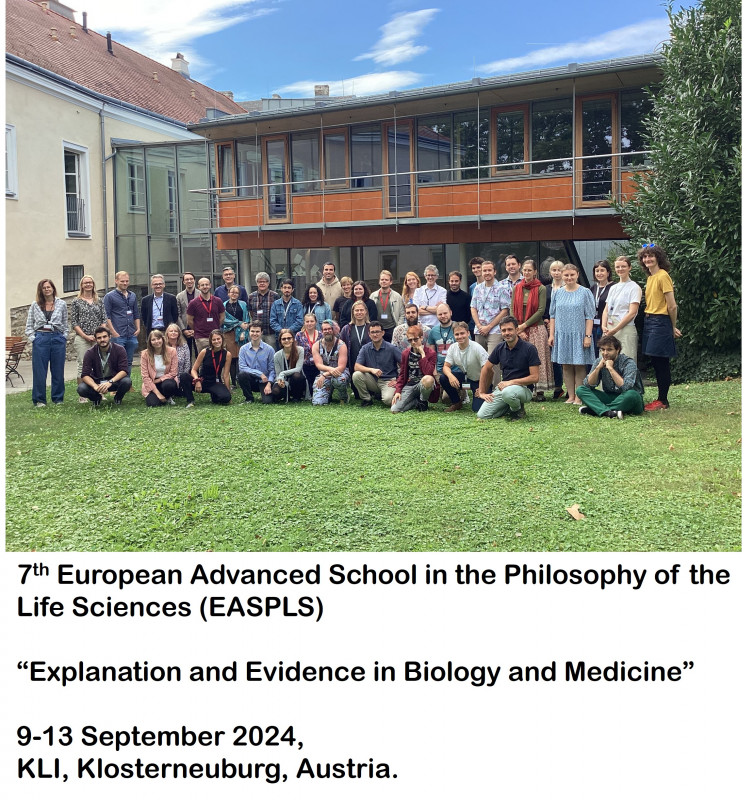News Details

The 7th European Advanced School in the Philosophy of the Life Sciences (EASPLS) was held at the KLI from 9th to 13th September 2024. The EASPLS is a biennial event that brings together PhD scholars and early career researchers alongside experienced and renowned academics in a carefully curated format, aiming to facilitate professional training, ignite research collaborations, and drive intellectual growth through engagement. It is organised by a consortium of institutes in Europe working at the forefront of Philosophy, History and Social studies of the Life sciences. This year's edition was led by Leonardo Bich (University of the Basque Country), Lucie Laplane (IHPST, CNRS/Université Paris I Panthéon-Sorbonne), Matteo Mossio (IHPST, CNRS/Université Paris 1), on the topic, “Explanation and Evidence in Biology and Medicine”. Lectures revolved around philosophical debates on explanation and evidence in the life sciences, analysing the existing strategies, evaluating their strengths, weaknesses, and mutual relations.
This year’s EASPLS welcomed 35 students from around the globe, nine instructors from the consortium of institutes and two distinguished invited speakers. The keynote lectures delivered by invited speakers Marie Kaiser (Bielefeld University) and Laura Nuño de la Rosa (Complutense University of Madrid) opened and closed the event. Morning sessions consisted of engaging talks from the instructors, which included Thomas Reydon (Leibniz University Hannover), Philippe Huneman (University Paris Panthéon-Sorbonne), Laura Menatti and Corey Bunce (KLI, Klosterneuburg), Maël Lemoine (University of Bordeaux), Leonardo Bich (University of the Basque Country), Sara Green (University of Copenhagen), Marcel Weber (University of Geneva) and Adrien Currie (University of Exeter). The talks by instructors and invited speakers addressed the topic of “Explanation and Evidence” from diverse perspectives and positions, fostering discussions wherein participants analyzed and reflected on explanation in different fields of the life and medical sciences. The lunches and the afternoons of each day were dedicated to student-focused activities that allowed participants to engage with their peers and instructors through structured interactions. Students presented and received feedback within small groups organized according to topics. They discussed the morning plenaries in bigger groups mixing backgrounds and countries. The students also benefitted from three career development sessions: one focused on mentoring and job applications, one on publishing and peer review, and a third session dedicated to caring for mental health in academia, which was facilitated by KLI fellows Laura Menatti and Marina Knickel.
All talks were open to members of the KLI. Many of the students expressed appreciation for the format, particularly valuing the feedback sessions on their work presentations; others appreciated the social aspect and the opportunity to interact with academics from across the world. Participants also interacted closely with Fellows of the KLI during coffee and lunch breaks tastefully arranged by the host institute, KLI. In addition to the academic program, participants also enjoyed a delightful dinner outing to the Barracuda Lounge at the Strandbad in Klosterneuburg.
Consortium of institutes organising the EASPLS:
Department of Philosophy, Faculty of Humanities, University of Geneva, Switzerland
Egenis, the Centre for the Study of Life Sciences, University of Exeter, UK
Konrad Lorenz Institute for Evolution and Cognition Research (KLI), Klosterneuburg, Austria
IAS Research Centre for Life, Mind and Society, University of the Basque Country (UPV/EHU), Spain
Institute for the History and Philosophy of Science and Technology (IHPST), University of Paris 1 Panthéon-Sorbonne & CNRS, France
Institute for Philosophy in Biology & Medicine (PhilInBioMed) & ImmunoConcEpT lab, University of Bordeaux & CNRS, France
Institute of Philosophy & Centre for Ethics and Law in the Life Sciences (CELLS), Leibniz University Hannover, Germany
Section for History and Philosophy of Science, Department of Science Education, University of Copenhagen, Denmark

